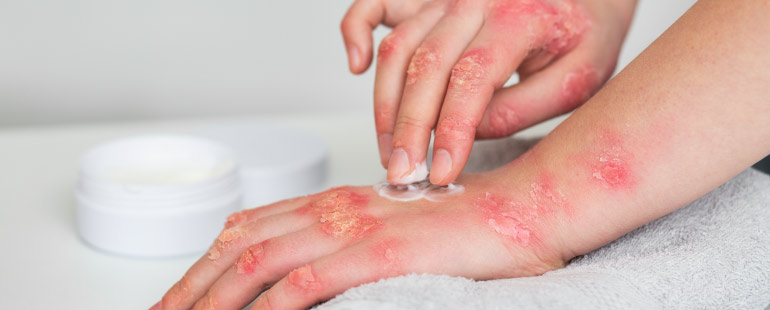Psoriasis Causes, Symptoms, Treatment - Assam Hospital

Psoriasis is a chronic inflammatory condition of the skin that affects 2-3% of the world population. According to the World Psoriasis Day consortium, around 125 million people worldwide have Psoriasis and have a mortality rate of 3.35 deaths for every 1,000 person-years. Psoriasis usually appears on elbows, knees, lower back, and scalp causing itchy/sore patches of thick dry, and discoloured skin.
Apart from skin, Psoriasis can involve nails, joints, and areas around the genitals. It is also associated with hypertension and other cardiovascular and metabolic abnormalities. Moreover, it can also affect the mental well-being of human beings leading to depression and other psychiatric problems.
Commons Signs and Symptoms of Psoriasis
Psoriasis signs can vary from small spots of dandruff-like scaling to big spots covering large parts of the skin. Symptoms of Psoriasis can also vary from person to person, depending on the type of Psoriasis.
Common types of Psoriasis
- Plaque psoriasis
- Guttate Psoriasis
- Pustular Psoriasis
- Inverse psoriasis
- Erythrodermic Psoriasis
Commons Signs and Symptoms of Psoriasis
- Reddish raised lesions with whitish scales mainly over bony prominences.
- Lesions that are itchy and pain occasionally
- Skin can be dry, cracked, that may bleed
- Thickened nails with ridges
- Swollen and stiff joint.
- Sore patches
- Grey scalps
What Causes and Triggers Psoriasis?
Psoriasis occurs due to a complex interplay between genetic predisposition and the external environment. This condition passes down through generations. You can say that “multiple generations need to be affected to allow Psoriasis to pass into future generations.” According to a survey by the National Psoriasis Foundation, a child is 65% likely to develop Psoriasis if both parents are diagnosed with Psoriasis. Generally, it is expected to be caused by two factors; genetics and the immune system.
Psoriasis Triggers
Multiple factors might trigger Psoriasis. Common triggers of Psoriasis disease include;
- Stress
- Infection
- Alcohol
- Smoking
- Diet
- Certain medications like prednisone, beta blockers and lithium
- Weather that’s precisely cold or dry
Treatment and Medication Options for Psoriasis
While there is no proven cure for Psoriasis, there are treatments, therapies, and medications that aim to;
- Reduce inflammation and scales
- Slowdown the growth of skin cells
- Remove plaques
The treatment depends on the degree of involvement. Treatment options for Psoriasis are available in three categories as follows.
Topical Formulations
Creams and ointments are applied to the skin to reduce mild to moderate Psoriasis. Topical Psoriasis includes;
- topical corticosteroids
- topical retinoids
- anthralin
- vitamin D analogues
- salicylic acid
- moisturiser
Oral Immunomodulation
People diagnosed with severe Psoriasis might need to use oral or injected medications, which may include;
- methotrexate
- cyclosporine (Sandimmune)
- biologics
- oral retinoids
Phototherapy
Therapies have always been the most preferred treatment option for Psoriasis. This treatment includes using UV rays or natural light to kill overactive white blood cells.
These treatment options might vary depending on the severity of Psoriasis. It is always recommended to consult with your doctor for better treatment.
Myths and Facts About Psoriasis Busted
August is psoriasis awareness month, so we have decided to burst into some common myths about Psoriasis. Psoriasis is an immune-mediated skin condition that causes crusty, flaky patches on the skin. Let’s gauge through some myths about Psoriasis.
- Psoriasis is contagious – It is an immune disease. There is no harm in hugging, shaking hands, and sharing food with someone with Psoriasis.
- Psoriasis results from poor hygiene – It has nothing to do with poor hygiene.
- Psoriasis is an adult disease – According to the national psoriasis foundation, approximately 20k children below ten years are diagnosed yearly.
- Psoriasis is untreatable – You can reduce its infection and symptoms with regular treatment.
- Psoriasis patients cant donate blood – They can absolutely, as there is no spread through blood transmission.
Psoriasis is a disorder in which skin cells accumulate and form scales and itchy, dry patches. Typically Psoriasis is thought to be a problem caused by a weak immune system. Triggers include infections, stress, and cold.
Psoriasis affects everyone equally, including men, women, and kids of all races and ages. The disease can display on various body parts at any time and can lead to other medical conditions. Consult your medical provider or dermatologist to understand how to manage symptoms best. You are not alone! These lifestyle tips can help patients with Psoriasis.
- Take regular bath
- Regular use of moisture
- Weight reduction
- Balanced diet
- Reduce stress
- Regular exercise and yoga
- Avoid drinking and alcohol
Psoriasis is not curable but can be treated. Anyone who believes they might have Psoriasis should immediately discuss this with their healthcare provider.






















 Call Us
Call Us Book Appiontment
Book Appiontment